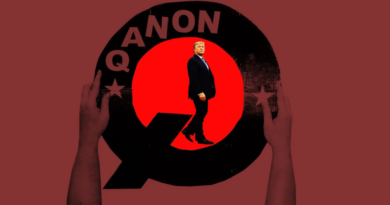Trump’s Covid diagnosis spawned conspiracy theories and showed the limits of ‘the resistance’

Those wishing for a swift end to the Trump presidency need to stop and think for a moment before leaping to embrace any one of a number of conspiracy theories surrounding his coronavirus diagnosis, most of which revolve around some version of the false idea that he is faking it for political advantage. To be clear: He is not, there is no evidence to support those assertions and there is no political advantage to be had.
Of all people, progressives — though we may now need to come up with another word for this — should understand that there are no easy answers to complex problems and that, in the real world, the principle of Occam’s razor still applies. Yet, in the wake of the news that President Donald Trump and his wife, Melania, had tested positive for Covid-19, conspiracy theories about the news trended all over social media and were eagerly spread by liberals.
The same style of misinformation (which then leads to radicalization) can be seen in adherents of QAnon, the radical far-right misinformation cult that has risen to broader prominence after Trump’s severe mismanagement of the nation’s response to a pandemic that has killed more than 200,000 Americans and more than 1 million people worldwide thus far.
What is seemingly driving the urge to believe that there is a grand nefarious plan afoot is that we are at an emotional nadir. We are experiencing something deeper than rage fatigue, coming after a cacophony of events that have undermined our ability to accurately discern the truth, pattern match and operate strategically. This is all happening at a volatile moment for our democracy and clearly raises the stakes for the coming election; there is already distrust on every side. None of this is occurring in a void.
We would understand all of that, and that our immediate rush to conspiracy theories was an irrational response to the news, if we had ever collectively identified our enemy: The true problem is not President Donald Trump, but a white supremacist culture that is corrosive to American democracy and powered his rise to the White House in the first place. He is a symptom, not the disease.
It has been easy for liberals to narrow the aperture and make the fight solely about defeating Donald Trump. But to do so absolves everyone of both their complicity in what really created this nightmare and of the responsibility to do the work to make sure we never end up in this place again. The problems in this country are not the fault of a single man, and it is important to keep that perspective in clear view.
For liberal voters, then, to embrace radical conspiracy theories about Trump’s ability to hold on to power strips from history the racism and economic immiseration that enabled a Trump presidency in the first place.
The allure of conspiracy theories is obvious: They offer us appealing heroes and appalling enemies when our lives feel beyond our own control. And, right now, an untold number of Americans are isolated by the pandemic, traumatized by personal and our collective losses and thus vulnerable to online radicalization. While Trump receives world class health care at Walter Reed National Military Medical Center, Americans are stitching together a social safety net through GoFundMe and Cash App. The economic misery Trump exploited for his 2016 election and expanded during his presidency are real. The trauma the Trump administration has unleashed on Black and brown people in this country is real. The political attacks on women’s autonomy, the unwinding of equal protections for LGBTQI communities and the unyielding assaults on our collective humanity are real.
But these are the trap doors that QAnon is also exploiting; they are the complexities that conspiracies flatten. And we do not win back our democracy or this country’s voters by playing the same game as extremists.
It is natural to want there to be one big, scary enemy to defeat, but this crisis is bigger than one person. Democracy is made up of people and Trump did not single-handedly erode our democratic institutions and plunge this country into crisis. So to operate as though everything comes down to Trump himself — which is certainly what he seems to believe — is to guarantee the continuation of this nightmare.
We have to stop believing in the fairy tale of “the resistance,” and its prepackaged narrative that ends with the demise of the Trump presidency. There is an understandable eagerness among some people to hark back to “better times,” to wish nostalgically that we could all just go back to the way things were before; Trump based his whole campaign on that idea, after all. But there is no going back to the pre-Trump years and, besides, what was “normal” then for some was far from just — and it was never good for everybody. What legacies we carry into the future is still up to us to define.
True resistance has to mean embracing the complexities of a nation of 330 million people and rejecting the return to business as it once was. When Trump is no longer president, there will be plenty of work to do, whether addressing institutional decay or fixing the erosion in public trust. America has always struggled with being accountable to its ideals, and the path to accountability does not end on Election Day.
None of this will be easy; there is only hard work ahead. But the hard work of making America actually great for every one of its people is a responsibility we cannot ignore and should not attempt to evade. We will get there by showing up: on Election Day, for our neighbors, in our communities, again and again.
*** This article has been archived for your research. The original version from NBC News can be found here ***

